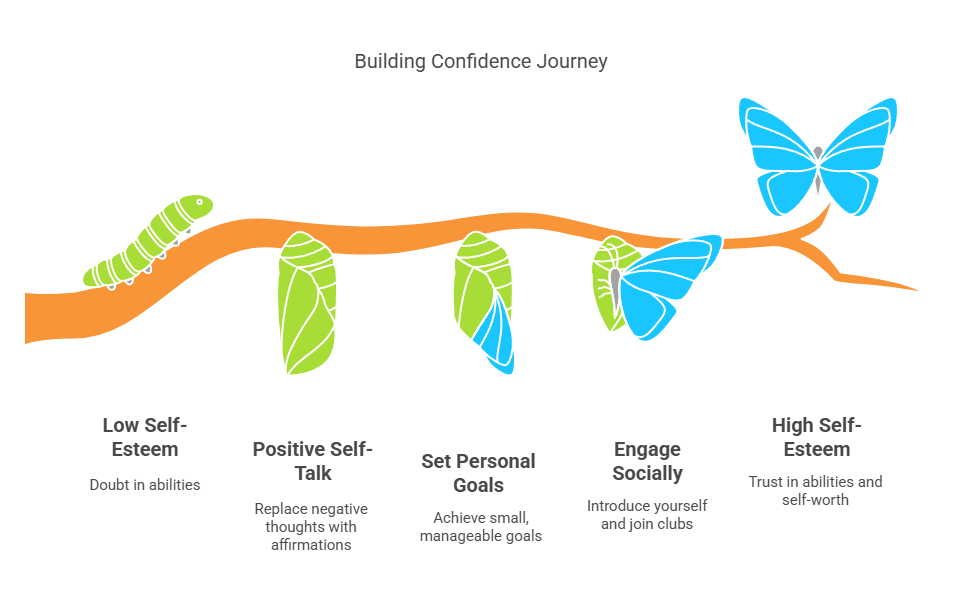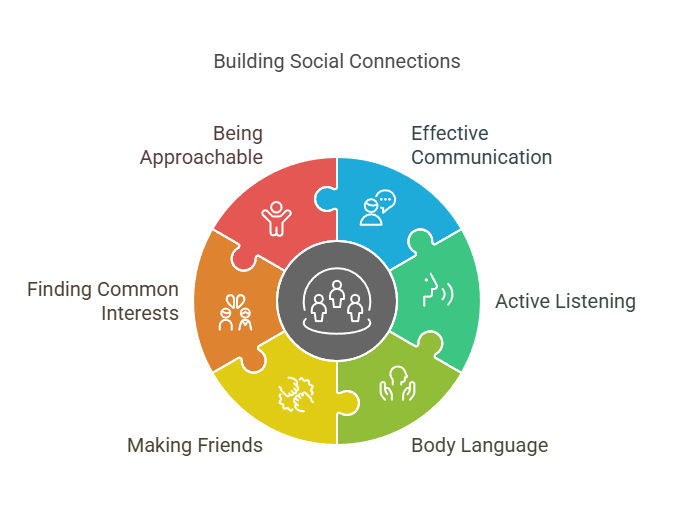Getting through that social maze at school can be as tough as it is interesting, however, knowing the exact way of becoming popular in school doesn’t have to be hard.
Trying to be popular is not only about getting all the attention; it’s about creating connections that are full of worth, getting others to respect you, and finally, feeling confident about being yourself.
No matter if you’re looking for ways to expand your circle or want to join the newest club or you just want to be more accepted, this guide is all about giving you actionable tips that will make you a social master.In this article, we shall acquaint ourselves with the psychology behind popularity, the importance of confidence, and how we can acquire the necessary social skills.
We will also touch on practical advice given to students about getting involved with school activities, considerations of dressing for success, and the importance of a positive reputation that lasts.
Consequently, you’ll have a roadmap leading to more popularity as every day new ways of becoming popular will come to you, and you’ll see that they still fit within your personality, by the time you’ve read this article. Let’s take a dip!
Why Popularity Matters in School
Being well-liked in school is often looked at as a way to get along with others well, but it actually has a more crucial role to play.
For the majority of students, popularity can be symbolic of a good support system, being accepted, and a feeling of being more self-assured.
Discovery of new opportunities is another positive aspect of social popularity, such as holding a leadership position in one of the clubs or sports teams, where it has a real impact on the enjoyment of school life.
Paradoxically, even though it is not an exclusive way of measuring success, social dynamics knowledge helps you to make valuable friendships and to develop the good ambience of the environment for you and others.
Read more: 7 Simple Strategies to Boost Your Self-Esteem
Building Confidence
The Importance of Self-Esteem
Belief in oneself is the cornerstone of popularity. When you trust in your skills, others are also more likely to trust you.
Self-esteem is what decides how you communicate with other people, handle your challenges, and show yourself to the world.
Doing something you’re good at, like engaging in a new club or talking to a new person for the first time, will be easier for the person who has a healthy sense of self-worth. it is also difficult to return to the same level as before injuries which is significant in the absence of certainty in schools.
Self-esteem is the most likely mechanism to form and maintain healthy relationships and get good grades, which are the elements of both personal and social success
Tips for Boosting Confidence
Building confidence doesn’t happen overnight, but with consistent effort, you can develop a stronger sense of self-worth.
Here are some actionable tips to help you boost your confidence and become more comfortable in social situations.
Positive Self-Talk
The way you talk to yourself has a significant impact on your confidence.
Negative self-talk, such as thinking, “I’ll never be good enough,” can hold you back and make you feel insecure. Instead, practice positive self-talk by replacing those negative thoughts with affirmations like, “I am capable,” or “I deserve to be happy.”
Over time, this shift in mindset can help you feel more confident and resilient.
For example, if you’re nervous about giving a presentation, remind yourself of past successes and tell yourself, “I’ve done this before, and I can do it again.”
Setting Personal Goals
Setting and achieving personal goals is another powerful way to build confidence.
tart with small, manageable goals, such as introducing yourself to one new person each week or joining a club that interests you.
As you accomplish these goals, you’ll gain a sense of achievement that boosts your self-esteem.
or instance, if you’ve always wanted to try out for the school play but felt too shy, set a goal to audition.
Even if you don’t get the part, the act of trying will help you grow more confident in your abilities.
Over time, these small wins will add up, and you’ll find yourself taking on bigger challenges with ease.
Developing Social Skills
Social skills are the cornerstone of popularity. They allow you to connect with others, build meaningful relationships, and navigate the complexities of school life.
Whether you’re an introvert or an extrovert, honing your social skills can help you feel more confident and accepted.
In this section, we’ll explore two key areas of social development: effective communication and making friends.
Effective Communication
Effective communication is more than just talking—it’s about connecting with others in a way that makes them feel heard and understood. Mastering this skill can help you build stronger relationships and avoid misunderstandings.
Active Listening
Active listening is one of the most important aspects of communication.
It involves fully focusing on the speaker, understanding their message, and responding thoughtfully.
For example, if a friend is sharing a problem, instead of interrupting or thinking about what you’ll say next, try to listen attentively and ask follow-up questions like, “How did that make you feel?” This shows that you care and value their perspective.
Active listening not only strengthens your relationships but also helps you learn more about others, making it easier to find common ground.
Body Language
Your body language speaks volumes, often louder than your words.
Simple gestures like maintaining eye contact, smiling, and nodding can make you appear more approachable and engaged.
On the other hand, crossed arms or looking at your phone while someone is talking can send the message that you’re uninterested.
For instance, if you’re introducing yourself to someone new, a firm handshake and a warm smile can leave a lasting positive impression.
Paying attention to your body language—and reading others’—can significantly improve your communication skills.
Making Friends
Making friends is a key part of being popular, but it doesn’t have to be intimidating. By focusing on shared interests and being approachable, you can naturally attract like-minded people.
Finding Common Interests
Shared interests are the foundation of most friendships.
Whether it’s a love for sports, music, or a particular TV show, finding common ground can help you bond with others.
For example, if you notice someone wearing a shirt from your favorite band, strike up a conversation by saying, “I love that band too! Have you been to any of their concerts?”
This simple connection can lead to deeper conversations and even long-lasting friendships. Joining clubs or groups that align with your interests is another great way to meet people who share your passions.
Being Approachable
Being approachable is about creating an environment where others feel comfortable talking to you.
Simple actions like smiling, making eye contact, and using open body language can make a big difference.
For instance, if you’re sitting alone at lunch, try leaving an empty seat at your table and inviting someone to join you.
You can also make the first move by complimenting someone or asking them a question about themselves.
Remember, people are more likely to approach you if you seem friendly and open.
Being Kind and Respectful
Kindness and respect are the cornerstones of lasting popularity. While charisma and confidence can help you stand out, it’s your ability to treat others with kindness and respect that will earn you genuine admiration and trust.
In this section, we’ll explore the power of kindness, how to be respectful to others, and why avoiding gossip and drama is essential for maintaining a positive reputation.
The Power of Kindness
Kindness is a superpower that can transform your social life.
Small acts of kindness, like holding the door for someone, offering a compliment, or helping a classmate with their homework, can leave a lasting impression.
Research shows that kindness not only boosts your mood but also creates a ripple effect, encouraging others to pay it forward.
For example, if you notice a peer sitting alone at lunch, inviting them to join your table can make them feel included and valued. Over time, these small gestures can help you build a reputation as someone who is caring and approachable.
Kindness also fosters deeper connections. When you show genuine concern for others, they’re more likely to trust and confide in you.
This creates a strong foundation for meaningful friendships and a supportive social network. Remember, popularity built on kindness is far more enduring than popularity based on superficial traits.
How to Be Respectful to Others
Respect is about valuing others’ feelings, opinions, and boundaries. It’s a key component of healthy relationships and a positive reputation. Here are some ways to show respect in your daily interactions:
- Listen Without Judgment: When someone is speaking, give them your full attention and avoid interrupting. Even if you disagree, acknowledge their perspective by saying something like, “I see where you’re coming from.”
- Be Inclusive: Make an effort to include everyone in group activities, especially those who might feel left out. For instance, if you’re planning a study group, invite classmates who may not be part of your usual circle.
- Respect Boundaries: Everyone has different comfort levels, so it’s important to respect personal space and boundaries. If someone seems uncomfortable with a topic or situation, change the subject or give them space.
- Apologize When Necessary: If you make a mistake or hurt someone’s feelings, a sincere apology can go a long way in repairing the relationship.
Avoiding Gossip and Drama
Gossip and drama can quickly tarnish your reputation and damage relationships. While it might be tempting to engage in rumors or take sides in conflicts, doing so can make you appear untrustworthy and immature. Here’s how to steer clear of drama:
- Stay Neutral: If you find yourself in the middle of a conflict, avoid taking sides. Instead, encourage those involved to resolve their issues respectfully.
- Don’t Spread Rumors: If you hear gossip, don’t repeat it. Remember, spreading rumors can hurt others and make you part of the problem.
- Focus on Positivity: Redirect conversations away from negativity by bringing up positive topics or sharing something uplifting. For example, if a group starts gossiping about someone, you could say, “I heard they did really well on the last test—that’s awesome!”
- Set Boundaries: If someone tries to drag you into drama, politely but firmly let them know you’re not comfortable discussing it. For instance, you could say, “I’d rather not talk about this—it’s not my place.”
Conclusion
Becoming popular in school is a journey that involves self-discovery, confidence-building, and developing strong social skills.
By understanding the different types of popularity, getting involved in school activities, and treating others with kindness, you can create a positive reputation that lasts.
Remember, true popularity comes from being authentic and staying true to yourself.
Start implementing these tips today, and you’ll soon find yourself not only more popular but also more confident and fulfilled.
Share your progress with us in the comments below, and don’t forget to spread the word by sharing this article with your friends!
FAQs
- How can I be popular without changing who I am?
- Focus on being the best version of yourself. Authenticity is key to lasting popularity.
- What are some quick tips to become more popular?
- Smile more, be approachable, and get involved in school activities.
- How do I deal with jealousy from others?
- Stay confident and kind. Jealousy often stems from insecurity, so don’t take it personally.
- Can being popular affect my grades?
- It can if you don’t balance your social life with academics. Prioritize your studies while staying socially active.
- How do I handle negative comments or rumors?
- Address them calmly and avoid engaging in drama. Seek support from trusted friends or adults if needed.





